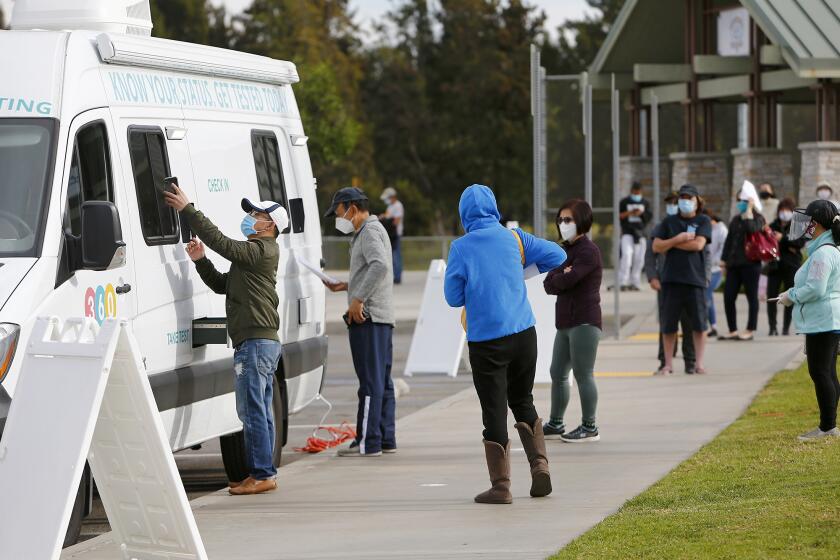UC Irvine researchers develop rapid antibody generation technology that could target COVID-19
- Share via
When the coronavirus pandemic hit, a team led by UC Irvine and Harvard Medical School researchers started discussing how to apply their ongoing work to the current climate.
The team of 17 people, which also includes researchers from the Ragon Institute and Duke University Medical Center, were already collaborating on a way to develop rapidly optimized antibodies for about two years.
“We decided to apply it to some coronavirus targets, the S-protein,” said Chang Liu, UCI assistant professor of biomedical engineering. “As we were furthering our development of the technology, it’s started working very well on these COVID targets.”
The result was developing in vitro technology that can rapidly hypermutate antibodies using a strain of yeast — the same strain that ferments wine and makes dough rise. The researchers nicknamed the system AHEAD or autonomous hypermutation yeast surface display in their preprint on BioRxiv.org.
“There are a lot of drugs on the market, which are basically antibodies ... These are used for treating inflammatory diseases, autoimmune diseases and cancer. It’s an extremely large industry with sales every year of about $100 billion,” Liu said.
But generating effective antibodies isn’t easy.
Typically, researchers prefer animal immune systems because of its evolutionary process that allows animals to produce effective antibodies over time. The process involves injecting animals with antigens (meaning viruses, bacteria, chemical or pollen) and analyzing how their immune systems respond with antibodies.
The Orange County Health Care Agency recorded 2,613 new coronavirus cases Wednesday — the highest single-day total recorded so far during the pandemic — and 974 hospitalizations from COVID-19.
The AHEAD system mimics the same process as animal immune systems.
Liu said there are a lot of reasons why people don’t want to rely on animals to generate antibodies — animal welfare concerns, the costs associated working with animals like llamas and the inability to target specific antigens.
“The significance with this system is we have the best of both worlds — a non-animal antibody generation system that can also contain the same evolutionary power as immune systems naturally do,” Liu said. “We can throw [any antigen] against it and we should be able to evolve good antibodies.”
The team is currently working on encoding the AHEAD technology into libraries in the OrthoRep system which would allow researchers to have access and test antigens.
They are also taking a preemptive approach to the possible evolution of the coronavirus, SARS-CoV-2, that causes COVID-19.
“Once an outbreak turns into a pandemic, you also run the risk that the virus itself is going to evolve,” Liu said. “As you throw treatments against it and as humans develop immunity against the virus, it might also be able to learn how to mutate so that it doesn’t respond to those treatments or existing immunity.”
Although that hasn’t come to pass yet, the AHEAD technology could accelerate the response in research.
“We’re interested in the long game for this as well,” Liu added.
All the latest on Orange County from Orange County.
Get our free TimesOC newsletter.
You may occasionally receive promotional content from the Daily Pilot.





